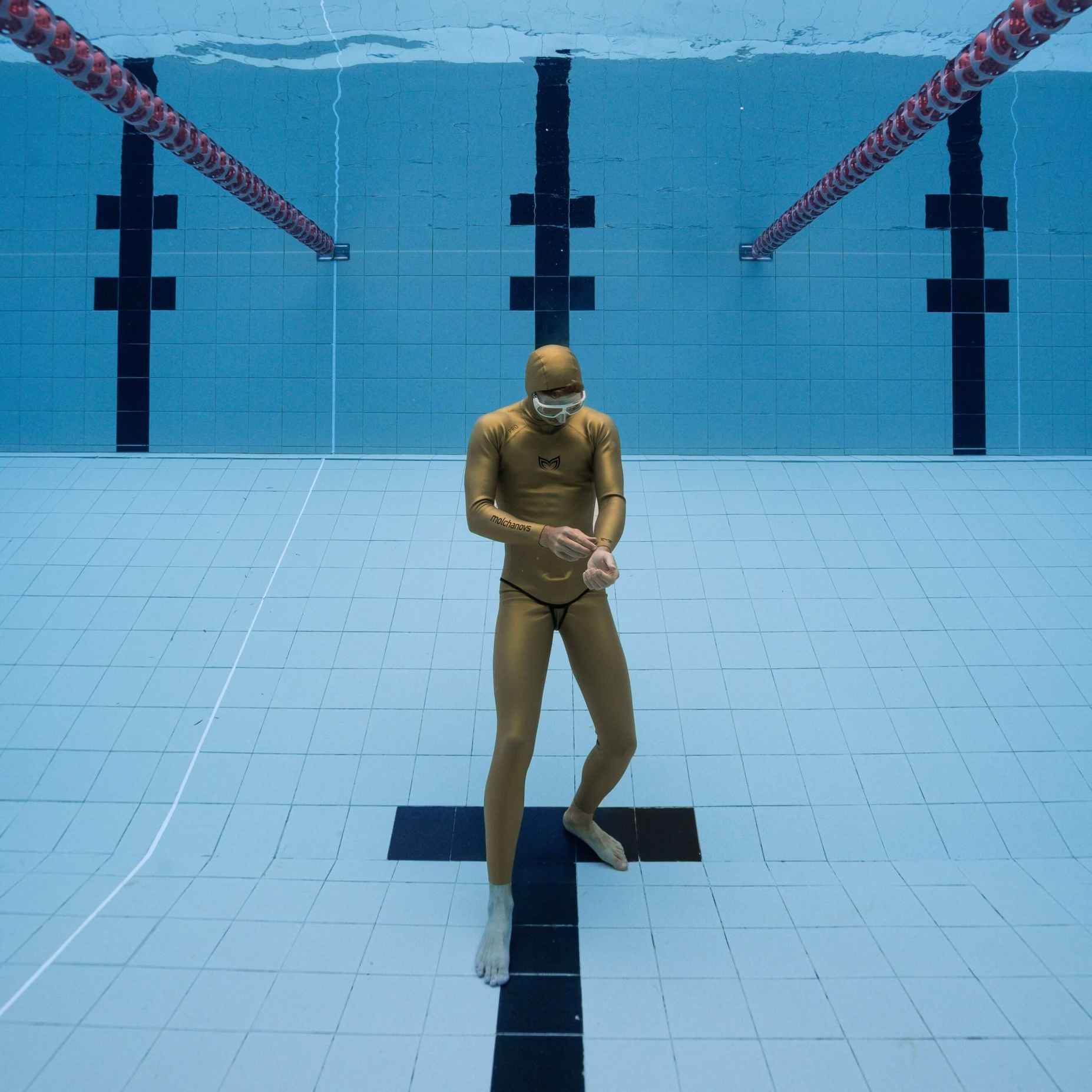Interview with Alexey Molchanov: How Lung Capacity Affects My Freediving

By Kristina Zvaritch
The average vital capacity (VC) of the lungs in an average, adult male ranges between 3 - 5 liters (L).
Someone should tell that to freediver Alexey Molchanov, who has set over 20 world records in freediving and is a 20x+ World Champion. He estimates that in peak shape before competitions, his VC goes up to an incredible 8L, and his total lung capacity with packing is roughly a mind-blowing 11L. We (virtually) sat down with Alexey to quiz him on this incredible progress and find out the secrets behind his success.

Kristina Zvaritch: Hi Alexey! I want to talk to you today about your phenomenal lung capacity. Can you tell us what your lung volume was before you began freediving and what it is now?
Alexey Molchanov: Hi Kristina! Well, I started freediving at the end of my swimming career in 2004, so I already had developed lungs as a swimmer. At the start of my freediving career in 2004, my lung volume was around 6.2 - 6.4L. Now, I estimate it goes up to 8L vital capacity before competitions, and with residual volume and packing - up to 11L.
KZ: Wow, so you already had bigger lungs before freediving, but what an improvement! Tell me more about that.
AM: Yes, so it was a big improvement for me. Around 20-25% extra lung volume for me over a period of 4 - 5 years, which is when the majority of my progress was. The first 10-15% of improvement, I got really quick within the first year. Over the next 3 or 4 years, I got the rest of the volume I needed to dive and equalize deep. That’s more about my ability to take a full inhale and the full volume of my lungs.
Regarding exhalation and my ability to withstand compression - it developed over another several years after my first 5 years of training freediving. I believe it was just because I was going deeper and doing more exercises with empty lungs. Flexibility also grew, but it’s not really clear how to measure the flexibility of the lungs. However, I can dive deeper with no squeeze, so that’s progress, for example.
KZ: Incredible. And I know your Foundational Breathwork program has just been released. I heard it contains the exercises you used to make this progress you just told me about. Can you tell me more about that?
AM: Yes, I started to do the exercises from my Foundational Breathwork program in the very first year of my career. It contains breathing, stretching, and flexibility exercises to increase total lung capacity, and includes full lung and empty lung exercises and stretches. I would say they contributed a lot to my smooth progression into becoming the freediver that I am today.
KZ: So how much of a percentage would you say that the exercises from your Foundational Breathwork program helped with your lung volume?
AM: It would be a rough estimation, because it also depends on the number of strength exercises a person does. Strength exercises are a part of my progression - I’ve always been doing them. If I only did strength exercises and not Foundational Breathwork exercises, my lung volume would be reduced since strength training reduces lung flexibility. Today, the breathwork exercises continue to play an important role in maintaining my mobility and maintaining my lung volume. I’d say it also continues to increase.
At the same time, I started freediving at the end of my swimming career, so I already had developed lungs as a swimmer. But for people who don’t have experience in previous sports, they can look for a 10% increase in a short period of time. In a longer period of time, say several months to a year, it can go to 20%. Actually, it can even go up to 30% depending on the intensity and time period - I have a story from a friend about that!
KZ: Tell me about your friend!
AM: He’s a really tough bodybuilder who also does Crossfit and has a lot of muscle mass, probably 110kg+ (243lb+). While he’s really muscular, he was also very restricted with his breathing - his lung volume before freediving was about 4.5L. Through exercises I shared with him from Foundational Breathwork, he increased his lung volume by 30% in less than a year. He also had a pretty low start, so people who don’t do much cardio and don’t have very strong breathing muscles may see progress like his.
KZ: That’s an intense amount of progress! For someone starting your program, how fast would you say they would start to see some noticeable improvement?
AM: My program is a 12-week program, so by the end of the 12 weeks, everyone should see a real, measurable improvement. Even after a month’s time, they should start feeling the benefits, and it’ll only increase month after month.
KZ: Wow, that’s quite fast. Well, I won’t ask you to spoil the entire program, but can you share with us your favorite exercise from Foundational Breathwork?
AM: My favorite one is the top-up inhale arm swings and rotation. It starts from a small-volume inhale (about 30%), and then you perform arm rotations, horizontal arm swings, and vertical arm swings. You do it for a couple of seconds, and then when you want to breathe, you top-up air and continue. I can really feel how it stretches my diaphragm and intercostal muscles in a short period of time. This exercise also increases shoulder blade mobility very well. Short but efficient, and it’s pleasant to have ease of breathing, especially for freedivers.
KZ: I’ll take note of that one! And speaking of ease of breathing, I also heard that breathwork is beneficial for non-freedivers too. Do you have anything you’d like to add about that before we wrap up the interview?
AM: I’d say that breathing better in general is good for all kinds of exercises - it increases the efficiency of recovery and getting better oxygen intake. This also boosts our moods because oxygen does have a direct impact on our well-being and mood. If we don’t have enough oxygen and have a hard time breathing in a relaxed way or feel tightness, this affects us. Oxygen has a direct relation with our life force.
Also, by maintaining control of our breathing muscles, pattern, techniques, and cycles, we reduce our stress levels and can manage stress better and not react to it. While training ourselves not to react to the stress of a breath-hold, that can help us in a variety of stressful situations in life.
Training breath-holds also trains our blood vessels. During a breath-hold, we have blood centralization after peripheral vasoconstriction happens, and more blood flows to the central organs (lungs, heart, and brain). This trains blood vessels in a unique way, making them become more elastic. There are even anecdotal stories of people reporting reduced blood pressure problems.
KZ: Fabulous, Alexey! Well thank you for all that information and I know we’re all wishing you continued progress in your dives and can’t wait to see what you do next!
AM: Thank you, Kristina - I look forward to that, too!
Foundational Breathwork with Alexey Molchanov is a Base Training + program that can be purchased for limited-time launch price of 75USD. Molchanovs Movement members and instructors can purchase the program for the discounted price of 60USD. Take the guesswork out of your freediving training and learn from one of the deepest men in the world. Click below for more information.




Leave a comment